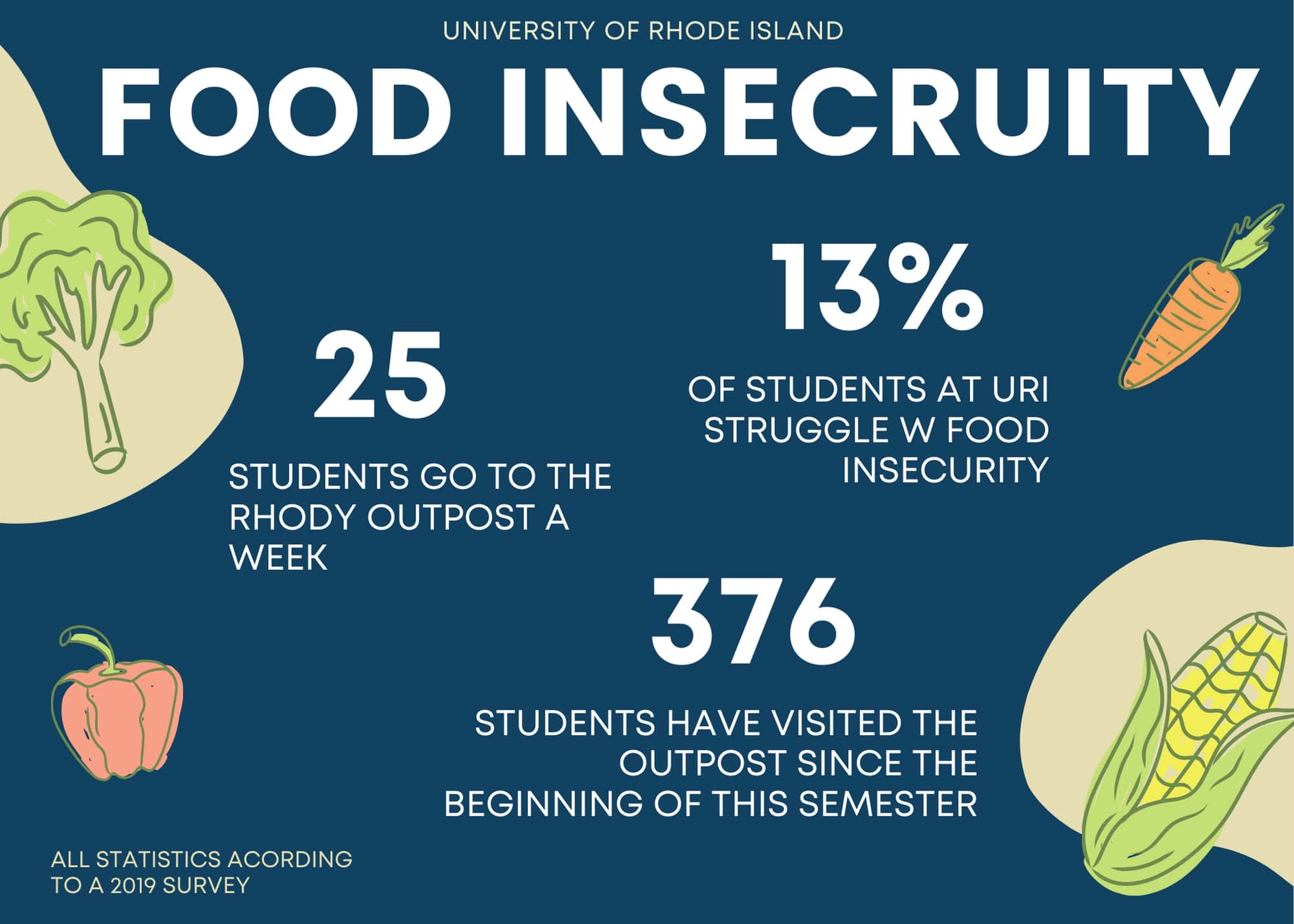Resources provide relief for community members
Three percent of students at URI reported experiencing food insecurity, according to a 2019 survey. PHOTO CREDIT: Siobhan Richards
According to a 2019 survey of students at the University of Rhode Island, 13 percent of students who answered the survey identified as being food insecure.
Over 25 percent of all URI students, about 2,300 people, completed this survey when it was first administered, according to Kathleen Gorman, director of the URI Feinstein Center for a Hunger Free America.
Gorman said that she suspects this percentage has increased in the past three years since the survey was administered. According to her, this is partly due to financial stress caused by the COVID-19 and partly due to skewed data from the original survey.
“A lot of the students that completed the survey in 2019 were living on campus where it is required to have a meal plan,” Gorman said. “I think that we got a pretty accurate representation of students with different living situations, however, we do have to keep that in mind when analyzing that data.”
Food insecurity is defined as the state of being without reliable access to a sufficient quantity of affordable, nutritious food, according to the U.S. Department of Agriculture. Jacqui Springer, assistant dean of student support and advocacy services, said that many students meet the definition of being food insecure but may not realize it due to a variety of different factors.
One reason students may not realize they are food insecure is that they are still able to afford food such as ramen noodles and pizza, but lack the funds to purchase healthy foods with sufficient nutrients, Springer said.
“These students might not look at themselves as being hungry because they are eating throughout the day, but they are still classified as food insecure because they do not have access to substantial meals,” Springer said.
Another reason students often do not realize they are food insecure is that they are relying on friends, family or others to provide meals for them, Springer said. An example of this, according to Springer, is when some students have friends with meal plans who swipe them into the dining halls at URI regularly when they do not have access to food.
Food insecurity affects students in many ways besides being physically hungry. According to Gorman, poor mental and physical health, as well as poor academic performance, have all been linked to food insecurity in college students.
“The students who were the most food insecure at the University of Rhode Island also reported a lot of psychological issues,” Gorman said. “They were more likely to report being depressed, irritable and not sleeping well.”
Students who are struggling with food insecurity have a multitude of different options offered by the University to help them gain access to nutritious food, Springer said. Rhody Outpost, an on-campus food pantry in St. Augustine’s Church, located at 15 Lower College Road, has had about 376 requests for food since the beginning of the spring 2022 semester, according to Springer.
“The pantry is open two days a week, on Tuesdays and Fridays,” Springer said.“Week to week, on average I’d say we have about 20-25 folks per week scheduling for pickup.”
Each week, Rhody Outpost updates what food is currently available for students to pick up, according to her. Students are then asked to fill out a form asking what food they wish to pick up and when they would like to pick it up.
Rhody Outpost isn’t the only option for students dealing with food insecurity at URI. Students can also access the Student First Fund from Dining Services and the Office of Student Affairs. This fund gives students who are food insecure flex meal plans and adds money into their RAM accounts who have utilized all of their student aid, Springer said.
URI also has the “Share a Swipe for Hope” program, which engages students in combating food insecurity through donating one of their dining hall swipes to students experiencing food insecurity.
“Students can donate meal swipes through GrubHub that will go into a bank,” Springer said. “So at any point, if a student is struggling to find food for any reason, they can come into the Dean of Students office where we can put meal swipes into their account on the spot.”
While URI hasn’t administered a food insecurity survey in the three years since, Springer said that there are no plans to send another one out in the near future.
“I don’t expect that it’s something we’re going to do while we’re still battling and navigating [COVID-19] because the questions that we would need to ask would be impacted by so many other factors,” she said. “It will give us a number, but it won’t give us the context of why their answers came out the way that they did.”
For more information about food insecurity or any of the resources available, students can visit web.uri.edu/rhodyoutpost.

